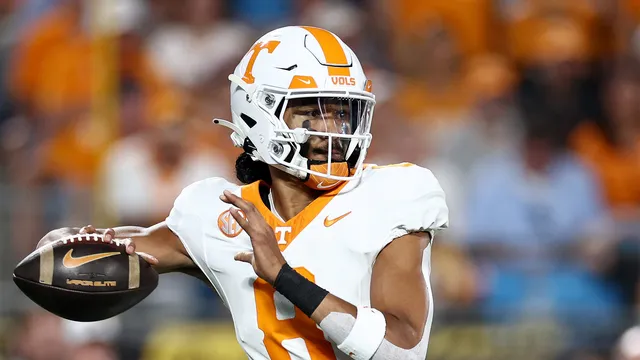
Tennessee football loses quarterback Nico Iamaleava amid controversy
2025-04-14 23:15- Nico Iamaleava was absent from Tennessee's Orange and White game and has been removed from the team roster.
- Coach Josh Heupel emphasized that no individual is more important than the program amid the ongoing challenges.
- The departure of Iamaleava opens up opportunities for other quarterbacks in the team leading into the upcoming season.
Express your sentiment!
Insights
In early April 2025, the University of Tennessee announced that quarterback Nico Iamaleava was no longer part of their football team, sparking a wave of discussion in the college football community. The announcement came after Iamaleava missed practice, which was perceived as an indication of a problem between the player and the program. Tennessee football coach Josh Heupel addressed the media after the team's Orange and White game, emphasizing that no individual player is greater than the program. Heupel highlighted the importance of moving forward with the existing team, including two promising four-star recruits who have shown great potential during Spring practice. Iamaleava had initially joined Tennessee with considerable fanfare, largely due to a high-profile name, image, and likeness (NIL) deal. However, his time was marred by scrutiny, as an ongoing NCAA investigation was examining elements of his recruitment and NIL contract. The investigation was officially established following concerns raised by the attorneys general of both Tennessee and Virginia in January 2024. Iamaleava’s desire for an increased NIL compensation and his subsequent withdrawal from practice raised questions about his commitment and the stability of the program. With the announcement of Iamaleava's departure, Tennessee is now searching for a way to restore harmony and success within its football team. Coach Heupel expressed confidence in the roster, stating,
Contexts
The introduction of Name, Image, and Likeness (NIL) deals has fundamentally transformed the landscape of college football, creating both opportunities and challenges for student-athletes, institutions, and the sport as a whole. Since the NCAA's policy change that allowed athletes to profit from their personal brands, an increasing number of football players have capitalized on their fame and success. This shift has enabled players to secure endorsement deals, participate in advertising campaigns, and monetize their social media presence, significantly enhancing their earning potential, particularly for top-tier athletes. This newfound financial freedom has been applauded as a way to address long-standing issues regarding the compensation of college athletes, who have historically been barred from receiving any direct payment for their contributions to college sports programs. However, the NIL landscape is not without its complexities and controversies. Critics argue that the implementation of these deals has exacerbated existing inequalities among college athletes. Powerhouse programs that consistently attract higher-profile recruits often have more resources to assist athletes in securing lucrative NIL opportunities, potentially widening the gap between well-funded programs and those with fewer financial means. Moreover, there are concerns about the impact of these deals on team dynamics and player recruitment, as athletes may prioritize financial opportunities over team loyalties or academic commitments, leading to a potential shift in culture within college football programs. Institutions are also navigating the changing landscape, adjusting their policies and resources to support athletes in managing their NIL opportunities effectively. Colleges are increasingly employing staff to educate players on the intricacies of contracts, brand management, and social media strategy, ensuring that athletes can make informed decisions regarding their personal brands. This support system is vital as players contend with not only contract negotiations but also the potential legal and ethical implications of their deals. Additionally, the involvement of boosters and alumni in facilitating NIL opportunities is raising questions about recruitment practices and the influence of money in college sports, necessitating careful oversight to maintain the integrity of the competitions. Moving forward, the impact of NIL deals on college football will continue to evolve as new policies and regulations emerge. Stakeholders, including athletic directors, coaches, and conference officials, are tasked with striking a balance between supporting athletes in maximizing their earning potential while upholding the mission of amateurism in college sports. As the landscape further unfolds, it is essential for ongoing dialogues between various stakeholders to address the implications of NIL arrangements on player development, competition equity, and the overall ethos of college athletics. The future of college football, influenced by the rise of NIL, will likely reflect broader societal trends concerning athlete empowerment and economic opportunity.